Majorities in both parties approve of keeping strict economic sanctions on Russia
Pew Research Center conducted this study to understand Americans’ attitudes toward the war in Ukraine. For this analysis, we surveyed 9,424 adults from July 1-7, 2024. Everyone who took part in this survey is a member of the Center’s American Trends Panel (ATP), a group of people recruited through national, random sampling of residential addresses who have agreed to take surveys regularly. This kind of recruitment gives nearly all U.S. adults a chance of selection. Surveys were conducted either online or by telephone with a live interviewer. The survey is weighted to be representative of the U.S. adult population by gender, race, ethnicity, partisan affiliation, education and other factors. Read more about the ATP’s methodology.
Here are the questions used for this report, the topline and the survey methodology.
With the conflict in Ukraine now in its third year, Republicans and Democrats continue to differ over U.S. policy toward the war-torn country.
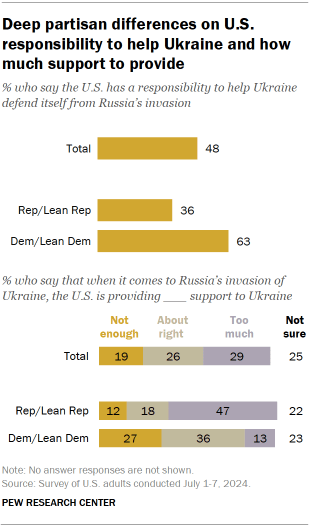
A 62% majority of Republicans say the United States does not have a responsibility to help Ukraine defend itself from Russia’s invasion.
Americans overall are evenly divided on whether the U.S. has a responsibility to help Ukraine (48% say it does, 49% say it does not).
- About two-thirds of Democrats and Democratic-leaning independents (63%) say the U.S. has this responsibility.
- Only about a third of Republicans and Republican leaners (36%) say the same.
Americans remain divided on levels of U.S. aid to Ukraine. Today, 29% of Americans say the U.S. is providing too much support to Ukraine, and a similar share say it’s providing about the right amount (26%). About two-in-ten (19%) say the U.S. is not providing enough support, while a quarter are not sure.
- Democrats largely say the U.S. is providing either the right amount of aid (36%) or not enough assistance (27%). Just 13% say the U.S. is sending too much aid to Ukraine.
- Nearly half of Republicans (47%) say the U.S. is providing too much aid to Ukraine, more than three times the share of Democrats who say this. Only 18% say current aid levels are about right, while just 12% say the U.S. is providing too little aid.
The new Pew Research Center survey of 9,424 U.S. adults was conducted July 1-7, 2024 – before President Joe Biden announced he was dropping his bid for the Democratic presidential nomination.
Related: Joe Biden, Public Opinion and His Withdrawal From the 2024 Race
How much of a threat does the war in Ukraine pose to U.S. interests?
The share of Americans saying Russia’s invasion of Ukraine is a threat to U.S. interests has declined significantly since 2022. Today, about a third of the public (34%) says Russia’s invasion of Ukraine poses a “major threat” to U.S. interests. Shortly after Russia invaded Ukraine, half said it was a major threat.
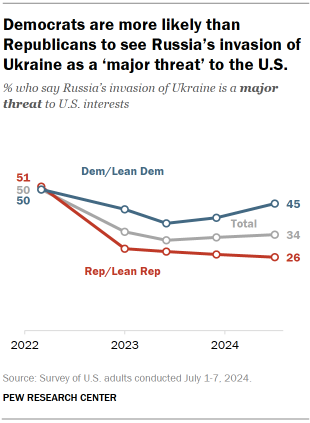
There is a wide and growing gap between Republicans and Democrats over whether the war in Ukraine is a major threat to U.S. interests.
Both Democrats and Republicans are less likely to say the conflict is a major threat to the U.S. than they were in its early days. But that decline is far sharper among Republicans.
- 45% of Democrats now say Russia’s invasion of Ukraine is a major threat, 5 percentage points lower than in March of 2022 but 7 points higher than a year ago.
- 26% of Republicans say the war is a major threat to the U.S. This share has been essentially flat since early 2023 and remains well below the 51% of Republicans who said this early in the war.
Views of U.S. policies toward Ukraine: Sanctions, military aid, strikes on targets in Russia
A greater share of Americans approve of keeping strict economic sanctions on Russia (69%) than approve of continuing to send military equipment to Ukraine (54%) or allowing Ukraine to use U.S. weapons to strike targets inside Russia (54%).
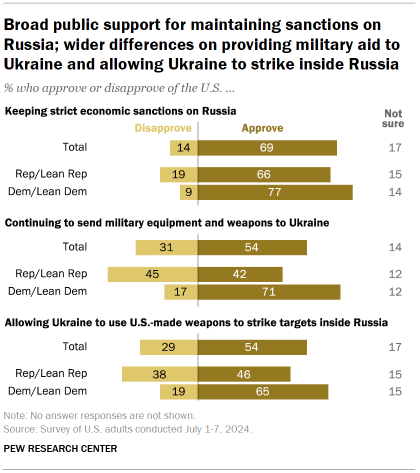
Majorities of both Republicans (66%) and Democrats (77%) approve of keeping strict economic sanctions on Russia.
Much smaller shares of Republicans approve of continuing to provide military equipment and weaponry to Ukraine (42%) or allowing Ukraine to use U.S.-made weapons inside Russia’s borders (46%).
Most Democrats approve of continuing to send military aid to Ukraine (71%) and allowing Ukraine to use American-made weapons to strike targets in Russia (65%).
Views of U.S. aid to Ukraine
Americans continue to be divided over the amount of aid the U.S. is providing to support Ukraine against Russia.
Over the past year and a half, the leading view among Republicans and Republican-leaning independents has been that the U.S. is providing too much support to Ukraine (47% say this currently).
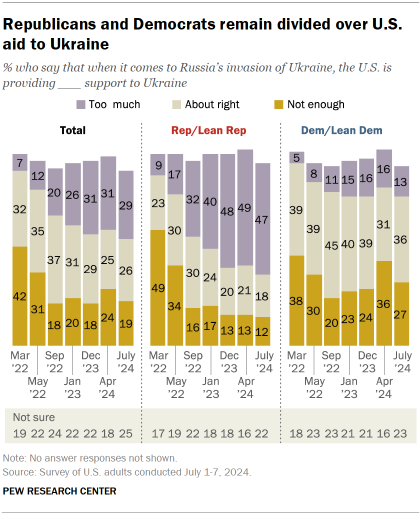
This balance of opinion among Republicans has not changed much over this period, and it represents a reversal from early in the conflict when fewer than a quarter of Republicans said the U.S. was providing too much aid.
Most Democrats and Democratic leaners have consistently said the U.S. is providing either too little or about the right amount of aid since the war began.
The share of Democrats who said the U.S. was sending too little aid increased in April, before a new $95 billion aid bill passed Congress. It has now returned to about where it was in late 2023. Only 13% of Democrats say the U.S. is providing too much aid to Ukraine.
Assessments of Ukraine’s military efforts and concerns about the war
Americans have mixed views of Ukraine’s military effort. Only 11% say Ukraine’s efforts to defend itself are going extremely or very well. More than twice as many (26%) say they are going not too well or not at all well. About four-in-ten (42%) say they’re going somewhat well.
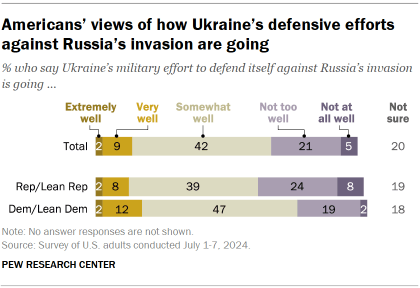
Republicans are slightly more pessimistic about Ukraine’s defense than Democrats. About a third of Republicans (32%) say Ukraine’s military efforts are not going well, compared with 21% of Democrats.
Nearly half of Democrats (47%) say Ukraine’s defense is going somewhat well. About four-in-ten Republicans (39%) say the same.
Concerns over the war in Ukraine
Americans express a range of concerns arising from the Russia-Ukraine war:
- 51% say they are extremely or very concerned that the war will continue for many years.
- A nearly identical share (50%) are extremely or very concerned that Russia will invade other countries in the region.
- Somewhat smaller shares are at least very concerned about Ukraine being defeated by Russia (43% are extremely or very concerned) and U.S. and NATO support for Ukraine leading to a war with Russia (41%).
Related: NATO Seen Favorably in Member States; Confidence in Zelenskyy Down in Europe, U.S.
Democrats are significantly more likely than Republicans to say they are highly concerned about Russia invading other countries in Europe and that Ukraine will lose and be taken over.

Six-in-ten Democrats say they are extremely or very concerned that Russia will invade other countries in the region. Roughly four-in-ten Republicans (42%) are as concerned about this.
A majority of Democrats (56%) say they are extremely or very concerned about Ukraine being defeated and taken over by Russia, compared with 33% of Republicans. Democrats’ concerns about Ukraine losing have increased modestly since 2022.
Republicans (45%) express somewhat higher levels of concern than Democrats (38%) that U.S. and NATO support for Ukraine will lead to a direct war between the U.S. and Russia. Concern among members of both political coalitions is somewhat higher than it was two years ago.




